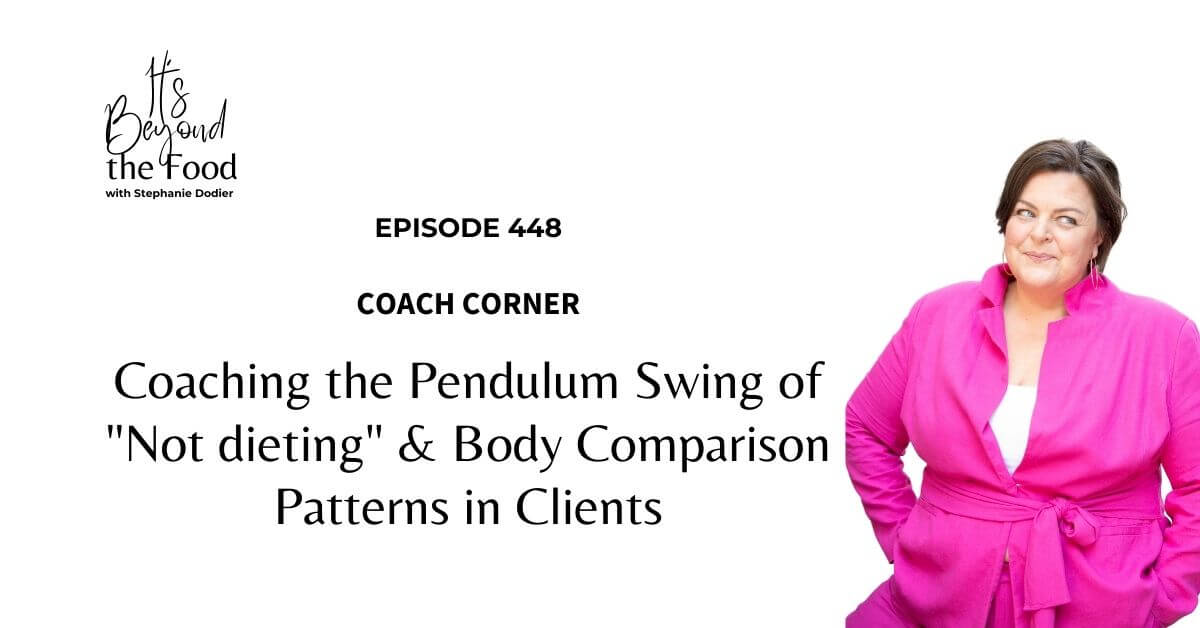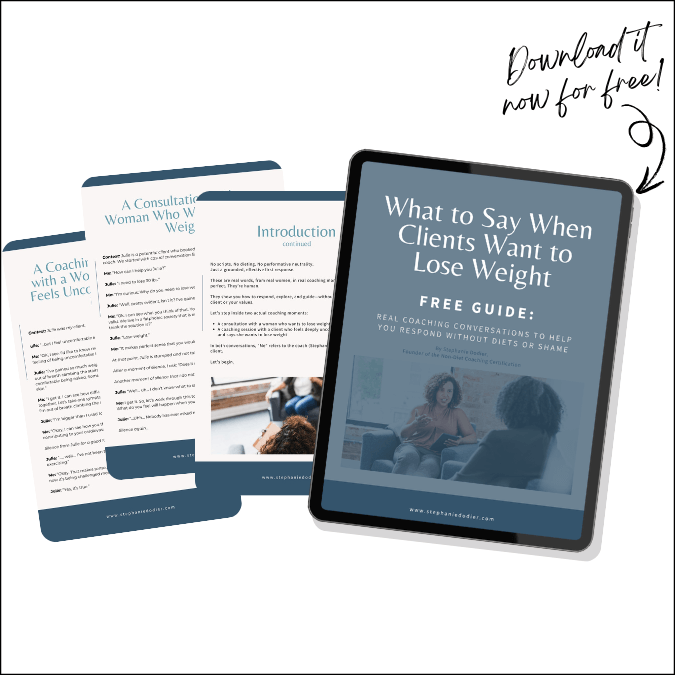

In this episode, I dive into two coaching struggles that show up with almost every non-diet client. I explain how I approach the pendulum swing and why this reaction is normal and predictable during healing.
I also unpack why body comparison intensifies when clients begin body image work. You will hear the tools I use to create safety, shift beliefs, and support clients through this vulnerable stage. This episode offers practical guidance for coaching the pendulum swing in non-diet clients with calm and confidence.
Episode Highlights & Timeline – Coaching the Pendulum Swing in Non-Diet Clients
[0:25] – I introduce the two coaching questions that guide today’s episode.
[1:00] – I share a resource for coaches who want deeper tools.
[1:46] – I read the pendulum swing question directly from Instagram.
[2:22] – I explain why the pendulum swing is normal for non-diet clients.
[3:17] – I discuss autonomy and psychological reactance with food.
[5:20] – I outline how to mentor clients through the swing with curiosity.
[6:11] – I coach on using “healthy” language and hidden mental restriction.
[8:18] – I share key takeaways on pendulum swings and mental restriction.
[9:11] – I begin the body comparison coaching question.
[10:04] – I explain comparison as a cognitive distortion linked to safety.
[11:57] – I teach how to support clients with belief transitions.
[13:18] – I share a self-coaching script to use after comparison moments.
[14:47] – I explain how new beliefs grow and dissolve comparison.
Mentioned in the show:
Non-Diet Coaching Certification Waitlist
What To Say When Clients Want To Lose Weight Guide
Weight-Neutral Coaching Training
Full Episode Transcript
This transcript was auto-generated and lightly edited for clarity.
Click to expand the full transcript
What causes the pendulum swing when clients stop dieting?
The pendulum swing happens because the body and brain are reclaiming autonomy after restriction. When clients stop dieting, their hunger signals, safety system, and natural drive for freedom react at once. This creates a rebound toward previously restricted foods, which is a normal and predictable response. It reflects the body restoring trust, not a lack of discipline.
Coaching the Pendulum Swing in Non-Diet Clients
[00:00:00] Stephanie: Welcome to It’s Beyond the Food Podcast, my sisters. I’m your host Stephanie Dodier, and in today’s episode, we’re answering two powerful coaching question that happen with almost every client. We’re looking at, number one, how to help client when the quote pendulum swing is in full effect and they’re doing the opposite extreme of what they want to do.
[00:00:25] Stephanie: Number two, we’re talking about body comparison and why it intensify as people are beginning their journey into healing their body image.
[00:00:39] Stephanie: Now, before we dive into how I coach through those two situations. If you love the short podcast episode, that gives you very specific coaching technique, you can go and grab the Coach Corner Vault, which is a library I’ve put together of over 50 mini training I’ve done [00:01:00] over the years on mindset, body image coaching, eating behavior, cognitive behavior coaching, and even business coaching specifically around behavior that you wanna coach yourself so that you can grow your business. If you wanna grab it, you can go to the show note associated with the podcast app you’re listening to right now, or you can go to stephaniedodier.com/coach-corner.
[00:01:28] Stephanie: Ready, let’s dive in. Question number one actually came in from a little question box in my Instagram stories, and you should be on my Instagram stories. There’s so much happening in there. This question I’m gonna read it verbatim and then I’m gonna. give you some coaching techniques.
[00:01:46] Stephanie: My client feels like she’s taking the no dieting to the extreme. She swung all the other way and she’s doing almost the opposite of what she wants to do, and she almost [00:02:00] refused to eat healthy. How do I coach this now? Is two parts in your question that are giving me coaching ammunition for you as a professional. We’ll start with the first one. The behavioral pattern that your client is presenting is a classic case of what we call pendulum swing.
[00:02:22] Stephanie: We see that in every client. We help unlearn diet culture. Your client has restricted herself for years. She’s followed the rules. She’s overridden her hunger. She tried to be ” good with food,” and when she stopped the restriction, when she stopped following the rules, when she attempts to eat, when she’s hungry, the opposite happened because it’s testing her safety level because this new path that she’s on, which she hired you to [00:03:00] help her with, is about reestablishing safety in new behavioral pattern. It’s not that she’s failing, it’s that she’s relearning to establish safety in these new circumstance. So this new paradigm.
[00:03:17] Stephanie: One other thing we have to understand is that human have an innate desire to be autonomous. So this pendulum swing where we do the complete opposite of what we used to do from restriction to eating all the things is actually an assertion of this autonomy. It’s like a teenager, right?
[00:03:43] Stephanie: You’ve had this child, which you, for all the good reason, controlled for years because the child wasn’t wise enough, intelligent enough, develop enough to make their own decision. And as they’re going through the teen years, part of the [00:04:00] 12 to like 20 years old range is learning to make your own decision wisely, intelligently, for you to become an autonomous human being.
[00:04:10] Stephanie: That’s what’s happening with your client right now. She’s reasserting this innate adult autonomy over her own eating choices and what to eat, there’s actually a psychological concept that’s
[00:04:23] Stephanie: called Psychological Reactance, where there’s this innate motivational drive to restore behavioral freedom as a functioning adult. So that’s a natural urge that human want, and specifically around food.
[00:04:39] Stephanie: We have all the equipment. We have our hunger. have our fullness. have a satisfaction cue within to make own choices. But the dieting model prevents you from asserting your autonomy for food. So that pendulum swing is reestablishing that. It’s reestablishing your ability to self [00:05:00] determine with food, and that’s why
[00:05:03] Stephanie: diets don’t work long term because this innate need for self-determination, for agency, for autonomy, all the time wins over restriction. Now, what do we do with our client? Now that you understand why the pendulum is swinging? What do we do with our client?
[00:05:20] Stephanie: Number one, this is when we switch into mentoring more, where we explain the swing to our client, we explain to her why it’s happening. We talk about autonomy, we talk about self-determination. We help her understand why the pendulum is swinging so that she can have self-compassion in her behavior, and then we move into helping her be curious instead of judgmental for the swing.
[00:05:53] Stephanie: Now that you understand why the swing is happening, why the swing is occurring, to [00:06:00] reestablish your safety into the new behavior for you to be autonomous and self-determined. Can we be curious in the moment, in the presentation of that swing.
[00:06:11] Stephanie: Now before we leave this client, I wanna talk about something you said in your question with which I’m gonna quote you here. She’s now ” refusing to eat healthy.” Now, I don’t know if this word came from you or came from your client, but either or whoever said those word, we need to coach on that because it tells us a lot about the belief system of the person that said those words. That it is you or your client, someone is believing that there is a ” way of eating healthy” and that we need to label food as healthy or not healthy, and that creates mental restrictions. Mental restriction is [00:07:00] the second stage of coaching people with the pendulum swing like we remove the physical restriction.
[00:07:06] Stephanie: That’s part of the intuitive eating process, but the mental and emotional restriction is often hidden behind the physical restriction. So when we lift the physical restriction, and we go through the pendulum swing at some point, like any pendulum, it’s gonna come back and the momentum’s gonna stop swinging because we’re reestablishing autonomy. We are being self-determined with our food. The pendulum’s gonna be in the middle, and that’s where we have normal eating pattern. But if the pendulum keeps swinging, it’s likely because there’s a mental restriction because the person believes there is healthy and unhealthy food, and there is healthy way of eating.
[00:07:47] Stephanie: So we’re still labeling food, causing a mental and emotional restriction, causing the swing to perpetuate itself. This is where cognitive behavior coaching is [00:08:00] so efficient in a coaching framework because we are able to investigate at the thought and the belief level of your client when we hear these words, to really help your client unpack mental and emotional restriction linked to quote, healthy eating. I.
[00:08:18] Stephanie: So if I was to give you some takeaway from this question, pendulum swing is 100% normal and predictable. It’s about reestablishing safety in new eating pattern and labeling food as healthy, shows you a mental and emotional restrictions still being present and potentially fueling that pendulum swing for your client.
[00:08:42] Stephanie: Question number two. My client friend lost weight because of GLP one, and she now, my client can’t stop comparing her body to her friend’s body, the new body that has lost weight. She knows that [00:09:00] diets don’t work. She doesn’t wanna take GLP one, so why can’t she stop comparing herself to her friend’s body. How do I help and coach that?
[00:09:11] Stephanie: The number one thing to understand for you as a coach is that body comparison or any comparison altogether is a cognitive distortion. It’s not an inherent personality trait or flaw. It’s actually a brain reaction to feeling unsafe. When we feel unsafe, we have coping mechanism to help us reestablish safety and all the cognitive distortion are nothing, but that.
[00:09:39] Stephanie: It’s an brain pattern of thinking to reestablish safety, in this case, to reestablish safety in her old belief, likely that thinner is better. So her brain is scanning her environment in this case her friend, her weight loss, her body [00:10:00] to prove her current belief that thinner is better.
[00:10:04] Stephanie: So I am assuming that you are in the process of doing some kind of body image work with her, building a new belief around body size, wellbeing, or body size and confidence or body size or body image altogether. But right now your client is at a stage where she has two belief in herself. She has the old belief is better.
[00:10:28] Stephanie: And the new belief all bodies are good body or a body neutrality belief like my body is a tool to experience my life, not a sign of my worth. However, you’ve done the work with her, so the two beliefs are inside of her right now and there is a friction. That cause a lack of safety.
[00:10:47] Stephanie: In her brain there’s two things going on at the same time, and people that are doing that kind of work when they don’t understand what’s happening, that can arise a lot of anxiety and a lot of fear [00:11:00] creating a lack of safety. And then we engage into this comparison game.
[00:11:05] Stephanie: So you have to see this comparison that she’s doing as a lack of safety, a cognitive distortion, and you have to explain that to her. Part of our role as coaches is explaining to our client why it’s happening. Why are they having the behavior that they’re having? Why are they experiencing the pattern of thinking that they are experiencing, showing them why it’s happening, that nothing has gone wrong.
[00:11:30] Stephanie: So they can see how their own brain, how their own nervous system is engaging them in the behavior that they’re currently experiencing. So you have to explain that to her. Explain to her what’s happening, why it’s happening, so that she can have compassion for her own behavior. We can’t change a behavior, any behavior, if we can’t have compassion for the behavior first.
[00:11:57] Stephanie: Everything we do, we do for a [00:12:00] reason, I say that over and over again to all my professional coach. Like when you see your client’s behavior, no matter how the behavior is and how different and what they wanna have for behavior, they’re doing it for a reason. And it’s most likely a lack of safety, which is exactly the case here.
[00:12:18] Stephanie: So number one, Explain her that she’s in the transition of belief and help her with tools and technique to build the new belief. That’s where intentional thinking tools inside the cognitive behavior coaching model comes in to help your client re-anchor the new belief, not by rejecting the old belief and shaming the old belief, but actually by saying,
[00:12:42] Stephanie: Thank you very much, brain. You’re bringing me back into this belief that thinner is better, and that’s why you’re making me compare myself to my friend’s body, her weight loss body. Thank you very much. Actually that is no longer how I [00:13:00] wanna create safety for myself. I wanna actually build the belief that my body is not a tool for me to feel better about myself, but it’s instead it’s a tool for me to experience my life. All bodies are good bodies.
[00:13:18] Stephanie: Now the narrative I just said here is what I give my client so that they can coach themselves in the moment where that comparison is happening now, maybe not in the moment where your client is out having a drink with a friend right then and there, but when they come home at night.
[00:13:39] Stephanie: There comes the self coaching part of it, that you teach your client how to self coach, and that’s when belief start building up. When we’re actually in the moment, in the thick of having these two belief, creating a friction, and we are not shaming the [00:14:00] old belief, we’re meeting the old belief with compassion and we reaffirm the new belief, that’s one of the two ways to build a new belief. As the new belief the body neutrality belief gets stronger and stronger and bigger and bigger, the comparison behavior will dissolve because your client will feel less unsafe. It will feel safer with the new belief and the comparison, the cognitive distortion will no longer be needed, so the brain will engage in comparison in time as the belief, the body neutrality belief, so it will dissolve by itself.
[00:14:47] Stephanie: Belief work is repetition. It’s time. And it’s self-compassion. So takeaway for question number two. Comparison is a coping mechanism. It’s a cognitive [00:15:00] distortion. It triggers when we feel unsafe. And the solution is explaining to our client what happening, why it’s happening, and the self-coaching tool in the moment to build the new belief around body neutrality.
[00:15:15] Stephanie: If this is the kind of coaching you want to master helping your client with new behavioral pattern learning, rooted in cognitive behavior coaching, rooted in weight neutral health, self-trust. This is the non diet coaching certification where you wanna head. That’s where I work with you for six months for you to master those coaching skills.
[00:15:41] Stephanie: So if you wanna learn more, head over to stephaniedodier.com/certification. Get your name on the wait list for the next cohort that will begin in January, 2026. Until next time, my sister’s. Coach behavior, not bodies. [00:16:00] wanna coach behaviors, not bodies. Learn the mindset tool and the method that create real changes.
[00:16:08] Join the wait list for the next cohort of the non diet coaching certification at stephaniedodier.com/waitlist. That’s where the real training begins, and I’ll see you on the other side, my sisters.







